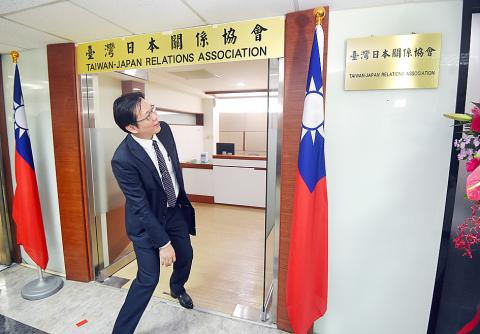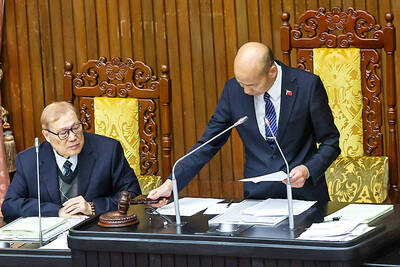Renaming Japan’s representative office in Taipei as the Taiwan-Japan Relations Association would help lessen misunderstandings and reflect Taiwan’s burgeoning relationship with Japan, association president Chiou I-jen (邱義仁) said yesterday at the official unveiling of the association’s new doorplate in Taipei.
“While people were clear about what we were concerned with when the office was first established, as time has gone by, many no longer have a clue,” Chiou said, recalling how he once received a telephone call asking him to resolve an issue in Hawaii.
“Finally” changing the name of the non-governmental agency, formerly known as the Association of East Asian Relations, Taiwan, after almost 45 years lends clarity to the association’s mission, he said.

Photo: Liao Chen-huei, Taipei Times
The association was established in 1972 to handle relations with Japan after diplomatic ties were broken off, with its Tokyo branch — the Taipei Economic and Cultural Representative Office in Japan — also serving as Taiwan’s de facto embassy in the nation.
While officially a civic organization under government contract, most employees simultaneously hold positions at the Ministry of Foreign Affairs.
The name change follows a similar change on the part of its Japanese counterpart earlier this year, which changed its name from Interchange Association, Japan to the Japan-Taiwan Exchange Association.
“Before we changed our name, a lot of people were not clear about our mission — we even had people calling and asking us about marriage matches,” Japan-Taiwan Exchange Association Representative Mikio Numata said, adding that the renaming is a “historic step,” as its name now conforms with reality.
“The name changes not only help the outside world understand the substantial content of both associations’ work — it also verifies the continued positive development of Taiwan-Japanese relations,” Minister of Foreign Affairs David Lee (李大維) said.
Relations have “never been better or more intimate,” he said, citing record-high bilateral trade and tourism.
Any discussion of renaming the Coordination Council for North American Affairs — which handles relations with the US — would have to wait until US President Donald Trump fills key Department of State vacancies, he said.
The ministry’s Japanese Political Affairs director, Fu Kuo-hua (傅國華), said the name changes primarily reflected a shift in Taiwan’s stance.
Japan had proposed using “Taiwan-Japan” to name the associations when official diplomatic ties were first broken off, but the proposal was rejected by Chiang Kai-shek’s (蔣介石) administration, which wanted to use “Chinese-Japanese,” he said.
China yesterday called the name change a “conspiracy” and urged Japan not to send “false signals” to Taiwan and the international community.
“We strongly object to this attempt to upgrade Japanese-Taiwanese relations,” Chinese Ministry of Foreign Affairs spokeswoman Hua Chunying (華春瑩) said. “We urge the Japanese government to scrupulously abide by the principles of the Japan-China Joint Communique, as well as all the promises which Japan has made to China to the present, including holding firm to the ‘one China’ principle.”
“The Japanese government should take concrete action to correct wrong methods and should not send false signals to Taiwan’s government and the international community, creating new interference for Sino-Japanese relations,” she said. “We also want to tell the Taiwanese government that any attempt to create ‘two Chinas’ or ‘one China, one Taiwan’ is doomed to failure.”
Additional reporting by CNA

DEFENDING DEMOCRACY: Taiwan shares the same values as those that fought in WWII, and nations must unite to halt the expansion of a new authoritarian bloc, Lai said The government yesterday held a commemoration ceremony for Victory in Europe (V-E) Day, joining the rest of the world for the first time to mark the anniversary of the end of World War II in Europe. Taiwan honoring V-E Day signifies “our growing connections with the international community,” President William Lai (賴清德) said at a reception in Taipei on the 80th anniversary of V-E Day. One of the major lessons of World War II is that “authoritarianism and aggression lead only to slaughter, tragedy and greater inequality,” Lai said. Even more importantly, the war also taught people that “those who cherish peace cannot

STEADFAST FRIEND: The bills encourage increased Taiwan-US engagement and address China’s distortion of UN Resolution 2758 to isolate Taiwan internationally The Presidential Office yesterday thanked the US House of Representatives for unanimously passing two Taiwan-related bills highlighting its solid support for Taiwan’s democracy and global participation, and for deepening bilateral relations. One of the bills, the Taiwan Assurance Implementation Act, requires the US Department of State to periodically review its guidelines for engagement with Taiwan, and report to the US Congress on the guidelines and plans to lift self-imposed limitations on US-Taiwan engagement. The other bill is the Taiwan International Solidarity Act, which clarifies that UN Resolution 2758 does not address the issue of the representation of Taiwan or its people in

The Philippines yesterday criticized a “high-risk” maneuver by a Chinese vessel near the disputed Scarborough Shoal (Huangyan Island, 黃岩島) in a rare incident involving warships from the two navies. The Scarborough Shoal — a triangular chain of reefs and rocks in the contested South China Sea — has been a flash point between the countries since China seized it from the Philippines in 2012. Taiwan also claims the shoal. Monday’s encounter took place approximately 11.8 nautical miles (22km) southeast” of the Scarborough Shoal, the Philippine military said, during ongoing US-Philippine military exercises that Beijing has criticized as destabilizing. “The Chinese frigate BN 554 was

LEISURE: The new law adds Confucius’ birthday, the anniversary of the Battle of Guningtou, Constitution Day and Little New Year as national holidays The Legislative Yuan yesterday passed new legislation adding four national holidays and making Workers’ Day a national holiday for all sectors. The Chinese Nationalist Party (KMT) and the Taiwan People’s Party used their combined majority in the legislature to push the jointly proposed draft through its third and final reading. This new law supersedes the existing regulations for the implementation of memorial days and state holidays, which are administered by the Ministry of the Interior. The new law recognizes Confucius’ birthday on Sept. 28, the anniversary of the Battle of Guningtou on Oct. 25, Constitution Day on Dec. 25 and “Little New Year,”